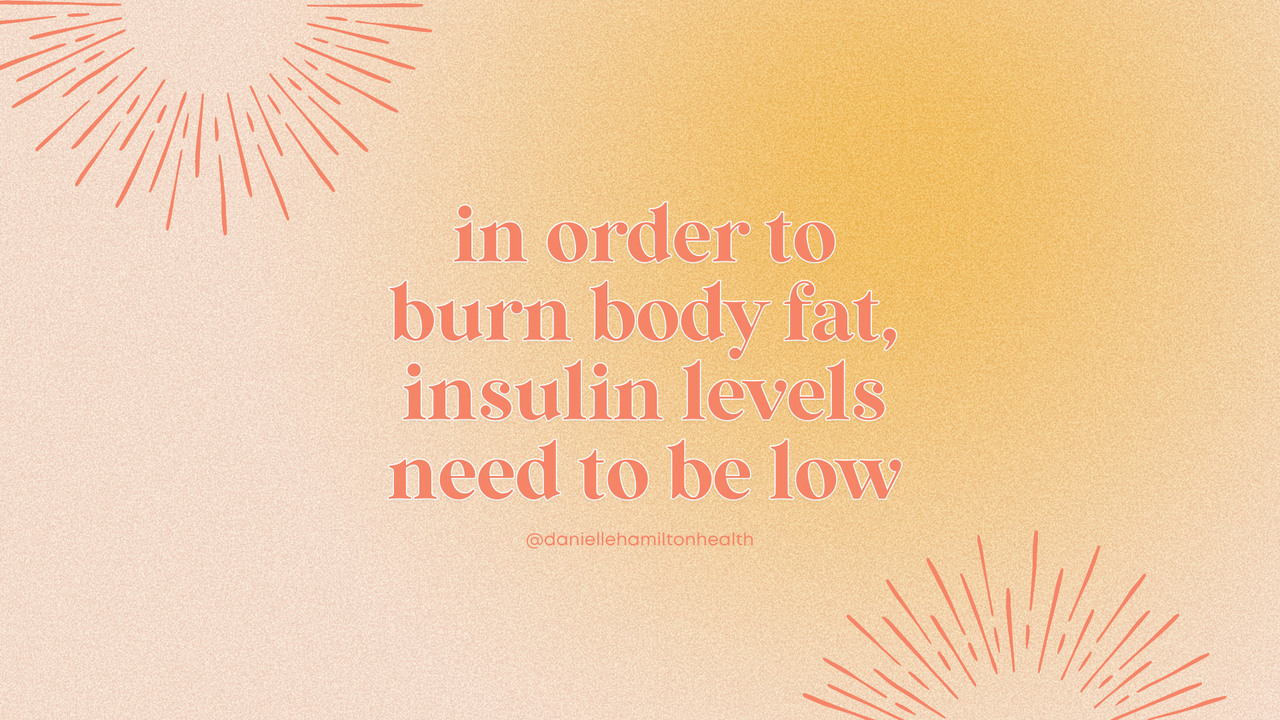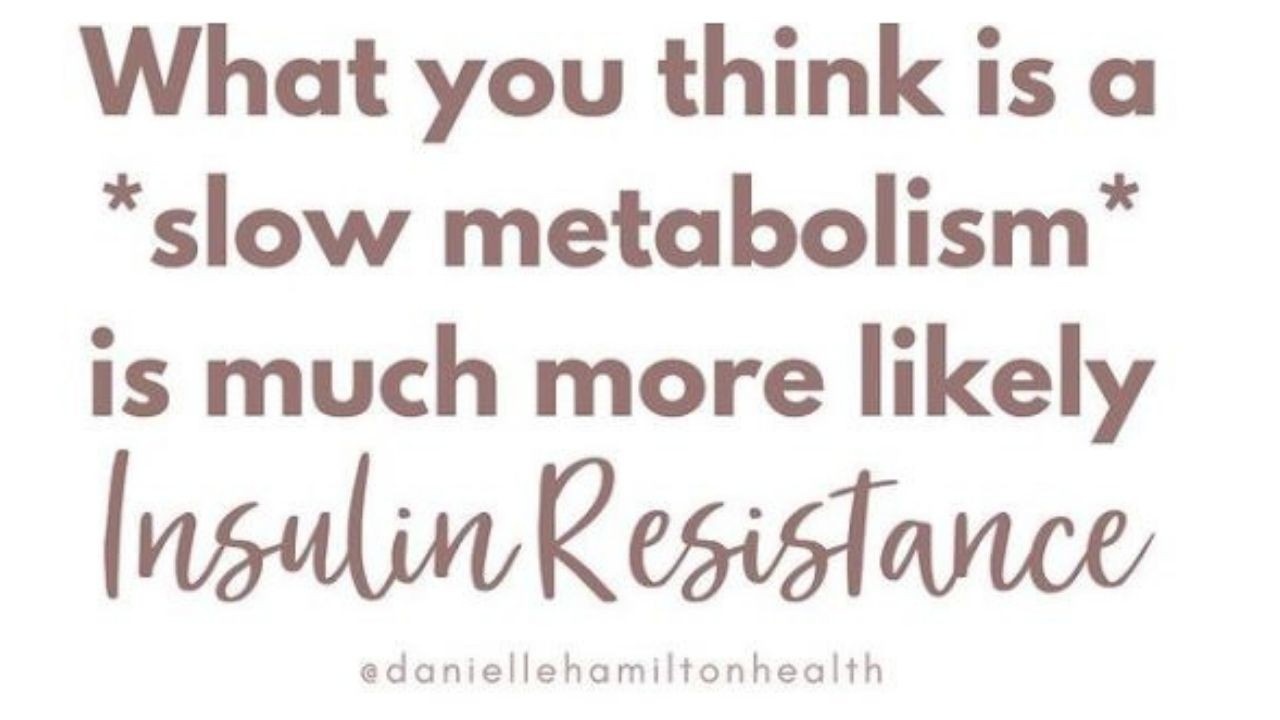Is Your Body Able to Burn Fat? You'll Want to Know!

Burning body fat is essential for keeping our energy levels up between meals, keeping us mentally sharp, and of course for losing weight.
When we can’t burn our body fat, we may hold on to excess weight, have cravings between meals, have energy or blood sugar crashes, have hormone imbalances, and so much more.
I see a lot of people in my practice who work out a ton but can’t lose body fat. A major cause of this is high insulin levels.
High insulin signals to the body to STORE fat AND at the same time blocks us from BURNING that fat.
High insulin essentially blocks us from using stored fat for energy so we become dependent on carbs to keep us energized.This makes it nearly impossible to stabilize blood sugar, stay away from carbs, and lose weight.
So how do you improve your insulin levels to better burn body fat?
In order to lower insulin levels, we can start with avoiding blood sugar spikes.
There are many other factors that help lower insulin levels like targeted workouts, eliminating ingr...
Eating Your Foods in This Order Helps to Reduce the Blood Sugar Response

Did you know that the order in which you eat your food can have a huge impact on how the foods affect your blood sugar?!
First off, thanks for @glucosegoddess for the graphs on slide 2!
So here’s how it works:
1️⃣ You start with vegetables (if you’re eating them). Of course these should be the low-carb, non-starchy veggies like these: 🥦🥬🥒🌶🫑🥗 The point of eating them first is that the fiber in the vegetables actually slow the absorption of the carbs and sugar in the foods.
So definitely choose salad over bread for starting a meal. Cooked veggies work too and are recommended over raw if your digestion/gut can’t handle raw veggies well.
2️⃣ Next, eat your protein and fats 🫒🍳🥩🥓🧈🍗🥥🦪. Again, this will help to slow and even reduce some of the absorption of the carbs.
3️⃣ Finally, have your carbs. Ideally, if you’re having carbs, they will be whole food carbs like these: 🍠🥔🥕🌽🍓🫐🍏🍑🍚.
Check out the graphs on slide 2 to see the impact of the order of the foods.
Please note: this hack is not going to erase...
Slow Metabolism? More Likely Insulin Resistance

Insulin is a hormone that tells the body to store sugar as fat. High insulin levels in the blood lead to Insulin Resistance.
When we are in a state of fat storage we can’t be in a state of fat burning.
Insulin resistance can easily make you feel like you have a slow metabolism because it causes weight loss resistance.
This was something I suffered with for years starting in 2013. I successfully reversed my Insulin Resistance and PCOS so I could finally get back to a healthy weight.
Weight Loss Plateau

Our bodies adapt quickly so if we do the same things all the time, we are headed straight for a plateau!!
One way to bust through these plateaus is to change things up.
If you’re doing keto, throw in a carb up day. If you’re doing 16:8 intermittent fasting daily, try a 5-1-1 instead. If you do the same workout all the time, change things up by doing different exercises.
Are you experiencing a plateau with your health or weight loss goals??
Sometimes the answer is also to dig deeper and look under the hood at things like digestion, adrenals, stress, sleep, light exposure, toxins or something else.
The Key to Stable Energy, Fat Burning & Metabolic Health is: Glycemic Control

What the heck is “balanced blood sugar” anyway?? It’s another way of saying GLYCEMIC CONTROL.
When we have good glycemic control, our blood glucose stays very stable in a tightly controlled range. There are no steep increases or sudden crashes. As you can see from these graphs, good glycemic control stays within that optimal green range.
On the other hand, poor glycemic control looks like the chart on the right. There are steep inclines and abrupt crashes in the blood glucose.
Why does that matter? Because those spikes and crashes will make you feel like shit!
everyone experiences blood sugar issues differently but here are some things you might feel:
•fatigue or energy crashes
•cravings, intense & urgent hunger
•shakiness, dizziness, lightheadedness
•anxiety, irritability or other mood issues
•brain fog or inability to concentrate
•poor sleep (notice the red crash in the early morning - that person probably woke up with a pounding heart!)
•headaches or migraines
•nausea, sweats
Overtime poor glyce...
Eating Every Few Hours Keeps Your Insulin Levels Elevated Which Tells Your Body to Store Fat

This outdated nutrition advice might be keeping you stuck with an inefficient metabolism & be blocking fat burning! (Literally the opposite of what they tell you it would do).
When you eat (especially snacks), your blood sugar rises and so does your insulin. Insulin’s job is to put the sugar in the cells of the body for use or storage.
When insulin is in the blood, the message the body gets is “store fat.”
If we are eating all day, we are constantly raising our insulin levels and keeping our body in a fat STORAGE mode.
You can’t burn fat and store it at the same time so this is how snacking actually blocks your fat burning.
Hot tip: Stop snacking!
Tip for getting started with this: Have your snacks right at the end of your meal instead of a few hours later.
Note: If you can’t make it to the next meal, try adding more fat and protein to your meals. If you’re getting shaky, hangry, anxious, fatigued, dizzy, or having any other sign of a blood sugar low, you should definitely eat. This is an ene...
Signs You're a Sugar Burner or Sign You're Metabolically Flexible

Are you a sugar burner, metabolically flexible or somewhere in between??
Becoming metabolically flexible (able to burn both glucose AND fat for fuel) was the biggest game changer in my health journey.
When I had no ability to tap into stored body fat for fuel, every few hours, I had to eat or I would feel shaky, lightheaded, hangry and anxious. I had no metabolic flexibility. i intuitively snacked and grazed to prevent these feelings.
This is called reactive hypoglycemia. It goes hand in hand with #InsulinResistance.
Now I can easily skip meals, sometimes I literally forget to eat (I used to think people who said that were making it up!), and I never feel INTENSE hunger.
My energy is stable throughout the day, I stopped having acne, I lost weight, and wouldn’t you know it, I no longer have Insulin Resistance, PCOS or PMS!🔥

